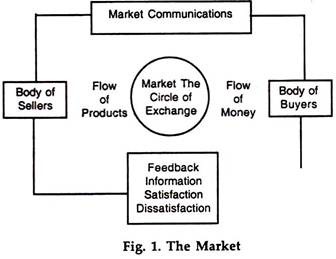After reading this article you will learn about Market:- 1. Meaning of Market 2. Concepts of Market 3. Types.
Meaning of Market:
The concept of market is very important in marketing. The American Marketing Association defines a market as the aggregate demand of the potential buyers for a product/ service. P. Kotler defines a market as an area for potential exchanges. Thus, a market is a group of buyers and sellers interested in negotiating the terms of purchase/sale for goods/ services.
The negotiation work may be conducted face-to-face at a certain place, e.g., a village mandi, or it may be done through other means of communication such as correspondence, phone or cable or it may be done through business middlemen, e.g., brokers and commission agents.
Exchange is the heart of commerce or marketing. Exchange is possible when there are two or more parties who have something they desire to exchange for something else. Exchange may take place with or without money. As a medium of exchange, money speeds trading. It may also be effected through middlemen in commerce, e.g., trader or agent. Middlemen also facilitate marketing operations.
Concepts of Market:
ADVERTISEMENTS:
The term ‘Market’ has three concepts:
1. Place Concept:
A market is a convenient meeting place for buyers and sellers to gather together in order to conduct buying and selling activities, e.g., a spot, cash or physical market, wholesale or retail market.
2. Market Concept:
ADVERTISEMENTS:
A market is an area, small or large, in which price-making forces of demand and supply tend to operate freely through modern means of communication such as phone, telex, correspondence, etc., and where informed buyers and sellers can establish close and continuous contacts to carry on exchange of goods and services without formal face-to-face meeting in such a market, price uniformity can be easily established place-wise through transport and time-wise through warehousing.
In this sense, we have a national or world market for many commodities. This is an economic concept of the term ‘market’. In this sense, meeting place for exchange is not essential and it is a matter of convenience only. For instance, a money market is a highly organised market for the entire nation without any central meeting place for borrowers and lenders of money.
3. Demand Concept:
The term market is also used to represent customer demand. In this sense, market means people with needs to satisfy, the money to spend and the will to spend money to satisfy their wants. The human being is a wanting animal having never-ending, varied and ever-changing wants.
ADVERTISEMENTS:
The process of want-satisfaction is continuous and under keen competition, sellers want to create, capture and retain the market (consumer demand) for their goods. A seller may be priced out of the market when his product has no demand. Every product has a life cycle. What was popular yesterday may not be popular tomorrow.
Note:
1. Exchange process is influenced by supply, demand, price, market information and legal control and regulations to ensure fair trading.
ADVERTISEMENTS:
2. Feedback gives buyer’s reactions. If favourable, seller gets repeat orders, if not, buyer will buy other brands.
In short, the three concepts of the term Market reveal the following main features:
(1) Meeting place for exchange is a matter of convenience.
(2) Buyers (demand) and sellers (supply) are the two sides of the market.
ADVERTISEMENTS:
(3) The meeting of minds is more important than face-to-face meeting in order, to create a market wherein we have one single price for an article of exchange the price determined by the free play of demand and supply.
(4) It is presumed that there is free competition in the market among the sellers and among the buyers.
(5) The exchange involves transfer of ownership and possession from a seller to a buyer in the market.
(6) The marketer limits market to the buyer side, i.e., the demand side of the economist’s concept of a market; the seller is called industry or competition in the market terminology.
Types of Markets:
ADVERTISEMENTS:
1. On the basis of selling area, we have local, national and international markets.
2. On the basis of article of trade, we have product markets, e.g., cotton market, bullion market.
3. On the basis of nature of exchange dealings, we have spot or cash market and futures or forward market.
4. On the basis of nature of goods sold, we have consumer goods market and industrial goods market.
ADVERTISEMENTS:
5. On the basis of period, we have short-term and long- term markets, e.g., money market for short-term funds and capital market for long-term funds.
6. On the basis of nature and magnitude of selling, we have wholesale and retail markets.
